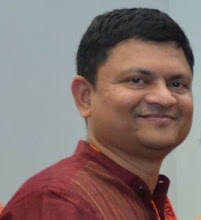... neti, neti ...
-Brihadaranyaka Upanishad, IV.V.15
Just as Yadnyawalkya is ready to renounce his home, one of his wives, Maitreyi asks him about the means of attaining immortality. Yadnyawalkya explains that anything we do, we do it indirectly for the Self. All the scriptures (vedas, itihasa, purana, vidya, upanishad, slokas, sutras, anuvyakhyanas, vyakhyanas) also spring forth from the Self. It is this Self that is indestructible. He goes on to describe the non-duality (अद्वैत ) and that it is that which one should strive for. Losing ones consciousness in it is what immortality is.
Maitreyi is still bewildered, so Yadnyawalkya further explains it thus: if there is duality then one sees another, smells another and so on. But when the duality is gone, what can one see (outside the Self) and with what? What can one smell, and with what? Through what can one know that due to which all is known? It is not this, not this (that) (neti, neti). Realizing such a Self is the only way to immortality.
Thus we see how the scriptures shifted from hero worship to polytheism to monotheism and there are already strains of monism with hints that gaining immortality means becoming one with this self.
Precursors of the current Hinduism have always been in flux, ever changing like a flowing river, trying to grasp at the meaning and purpose of life. To "what is Hinduism" too we can easily reply "neti, neti". May be that also holds for many current questions like "what is the solution to the crisis the politicians - that we ourselves elect - land us in" or "what is the solution to the perceived and real religious strifes going on all over the world". May be we need to take a deep breath, look inside ourselves and try to draw an all-encompassing picture like Yadnyawalkya had in mind, rather than quick short-sighted solutions.
Friday, December 29, 2006
Subscribe to:
Post Comments (Atom)




No comments:
Post a Comment